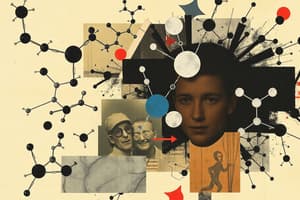Podcast
Questions and Answers
What is the hybridization of the carbon involved in the triple bond in propyne?
What is the hybridization of the carbon involved in the triple bond in propyne?
- sp3
- sp2
- sp (correct)
- dsp2
What is the bond angle of the carbon involved in the triple bond in propyne?
What is the bond angle of the carbon involved in the triple bond in propyne?
- 90O
- 120O
- 180O (correct)
- 109O
What is the hybridization of the middle carbon in propadiene?
What is the hybridization of the middle carbon in propadiene?
- sp2
- sp3
- dsp3
- sp (correct)
What is the geometry of the carbon involved in the triple bond in propyne?
What is the geometry of the carbon involved in the triple bond in propyne?
What is the bond angle of the carbon involved in the single bond in propyne?
What is the bond angle of the carbon involved in the single bond in propyne?
What is the hybridization of the end carbons in propadiene?
What is the hybridization of the end carbons in propadiene?
What is the geometry of the end carbons in propadiene?
What is the geometry of the end carbons in propadiene?
What is the bond angle of the end carbons in propadiene?
What is the bond angle of the end carbons in propadiene?
What is the general formula for saturated hydrocarbons, also known as alkanes?
What is the general formula for saturated hydrocarbons, also known as alkanes?
What is the shape of s-orbitals in organic chemistry?
What is the shape of s-orbitals in organic chemistry?
Which of the following hydrocarbons have at least one carbon-carbon double bond?
Which of the following hydrocarbons have at least one carbon-carbon double bond?
According to the Aufbau principle, how are atomic orbitals filled?
According to the Aufbau principle, how are atomic orbitals filled?
What type of bond is characteristic of aromatic hydrocarbons?
What type of bond is characteristic of aromatic hydrocarbons?
Which of the following compounds is composed only of carbon and hydrogen?
Which of the following compounds is composed only of carbon and hydrogen?
What typically characterizes the elements in Group VIII?
What typically characterizes the elements in Group VIII?
What is the purpose of making models of molecules such as methanol and formaldehyde?
What is the purpose of making models of molecules such as methanol and formaldehyde?
How does ionic bonding typically occur between two atoms?
How does ionic bonding typically occur between two atoms?
What does the electron configuration of an atom primarily describe?
What does the electron configuration of an atom primarily describe?
What is the main characteristic of unsaturated hydrocarbons?
What is the main characteristic of unsaturated hydrocarbons?
What do molecular formulas describe in a molecule?
What do molecular formulas describe in a molecule?
Which statement about the periodic table is true?
Which statement about the periodic table is true?
What is the general formula for unsaturated hydrocarbons with at least one carbon-carbon triple bond?
What is the general formula for unsaturated hydrocarbons with at least one carbon-carbon triple bond?
In ionic bonding, what do charged ions result from?
In ionic bonding, what do charged ions result from?
What is characteristic of p-orbitals in organic chemistry?
What is characteristic of p-orbitals in organic chemistry?
What is the name of the compound CH3CH2CH2CH2CH2Cl?
What is the name of the compound CH3CH2CH2CH2CH2Cl?
What is the name of the compound CH3CHCH2CH3?
What is the name of the compound CH3CHCH2CH3?
What is the most stable conformation of propane?
What is the most stable conformation of propane?
What is the most stable conformation of butane?
What is the most stable conformation of butane?
What is the name of the compound 1-bromo-1-chloropropane?
What is the name of the compound 1-bromo-1-chloropropane?
What is the type of isomerism exhibited by CH3CH2CH2CH2CH2Cl and CH3CH2CH2CHCH3Cl?
What is the type of isomerism exhibited by CH3CH2CH2CH2CH2Cl and CH3CH2CH2CHCH3Cl?
What is the advantage of the equatorial position in the cyclohexane chair?
What is the advantage of the equatorial position in the cyclohexane chair?
What is the type of isomerism exhibited by the two chair forms of cyclohexane?
What is the type of isomerism exhibited by the two chair forms of cyclohexane?
What is the name of the compound CH3CCH2CH3?
What is the name of the compound CH3CCH2CH3?
What is the difference between the staggered and eclipsed conformations of propane?
What is the difference between the staggered and eclipsed conformations of propane?
What is the molecular weight of 1-bromo-2-methylcyclopentane?
What is the molecular weight of 1-bromo-2-methylcyclopentane?
Which geometric isomerism type is shown in 1-bromo-2-methylcyclopentane?
Which geometric isomerism type is shown in 1-bromo-2-methylcyclopentane?
Identify the type of isomerism exhibited by 1-bromo-3-methylcyclopentane.
Identify the type of isomerism exhibited by 1-bromo-3-methylcyclopentane.
Which of these compounds is a cis isomer?
Which of these compounds is a cis isomer?
What type of isomerism occurs when the longest carbon chain is systematically shortened?
What type of isomerism occurs when the longest carbon chain is systematically shortened?
Which compound is an example of a trans isomer?
Which compound is an example of a trans isomer?
Flashcards are hidden until you start studying
Study Notes
Atomic Orbitals and Electron Configuration
- Common orbitals in organic chemistry include s-orbitals (spherical) and p-orbitals (dumbbell-shaped).
- Orbitals are filled based on the Aufbau principle, from lowest to highest energy levels.
- Each atomic orbital can hold up to two electrons.
- The electron configuration indicates which orbitals are occupied and the number of electrons in each.
Organization of the Periodic Table
- The periodic table organizes elements by electron configuration, periods related to outermost electron shells, and groups corresponding to outer shell electron count.
- Elements in the same group share the number of outer shell electrons and similar electron configurations, differing only in the shell number.
Stable Octets
- Group VIII elements are particularly stable due to achieving a stable octet configuration in their outer shell.
Ionic Bonding
- Ionic bonding involves the complete transfer of electrons between atoms with differing electronegativities, forming charged ions.
- Cations carry a positive charge (loss of electrons), while anions carry a negative charge (gain of electrons).
- The ionic bond forms through the attraction between the positive cation and negative anion.
Hybridization and Molecular Geometry
- sp-hybridized carbons in triple-bonded propyne exhibit linear geometry with bond angles of 180°.
- sp³ hybridized carbons display tetrahedral geometry with approximately 109° bond angles.
- sp² hybridized carbons, involved in double bonds, feature trigonal planar geometry with 120° angles.
Hydrocarbons Classification
- Hydrocarbons consist solely of carbon and hydrogen, divided into saturated (alkanes) and unsaturated compounds (alkenes, alkynes, aromatic hydrocarbons).
- Alkanes have the general formula CnH2n+2 and involve only single bonds.
- Alkenes possess at least one carbon-carbon double bond (CnH2n), while alkynes have at least one triple bond (CnH2n-2).
Molecular and Structural Formulas
- Molecular formulas provide the number and types of atoms in a molecule.
- Structural formulas depict the arrangement of atoms and bonds, aiding in understanding isomerism.
Isomerism
- Skeletal isomerism arises when compounds have the same molecular formula but different connectivity.
- Positional isomerism involves differing locations of functional groups within a molecule.
Newman Projections and Conformational Isomers
- Newman projections visualize the spatial orientation of atoms in a molecule, indicating stable (staggered) and unstable (eclipsed) conformations.
- Conformational isomers vary in their rotational orientations around single bonds; stability is influenced by steric hindrance.
Cyclohexane and Chair Conformation
- Cyclohexane can exist in chair conformations, with substituents in axial (up/down) or equatorial (side) positions.
- Equatorial positions are more stable due to reduced steric hindrance.
Geometric Isomerism in Cyclic Compounds
- Geometric isomers differ in the spatial arrangement of groups around a double bond or within a ring structure, classified as cis (same side) or trans (opposite side).
Molecular Weights
- Molecular weights of hydrocarbons are determined by summing the atomic weights of constituent atoms. For example, C8H18 can be calculated through its systematic structure.
Studying That Suits You
Use AI to generate personalized quizzes and flashcards to suit your learning preferences.




